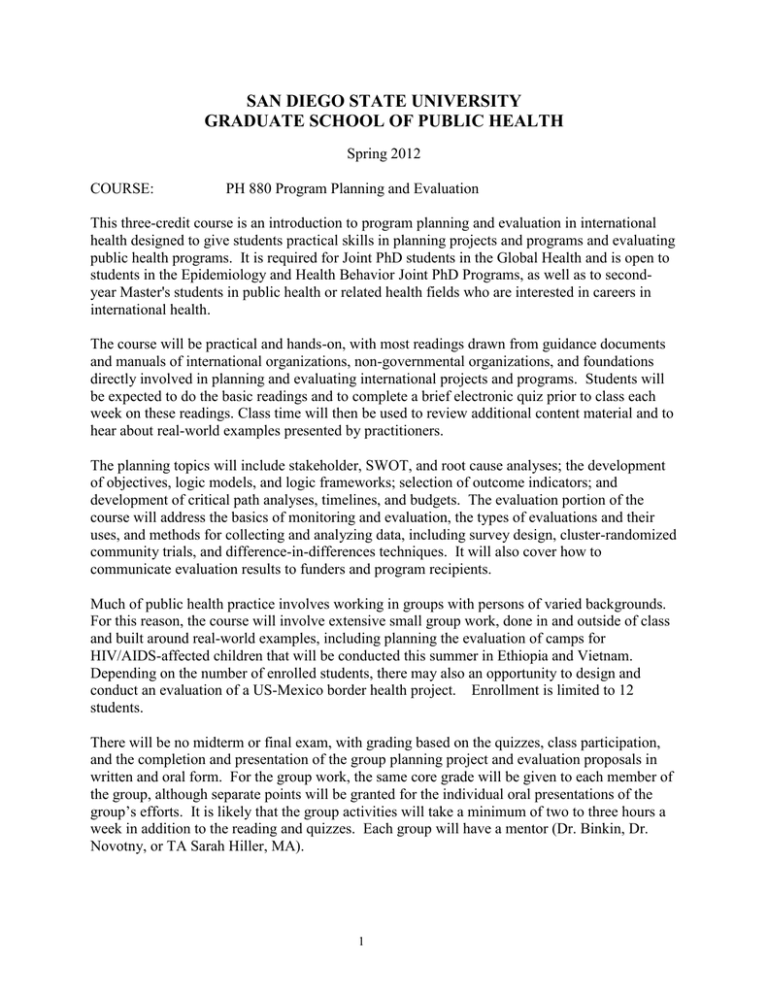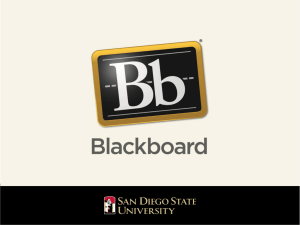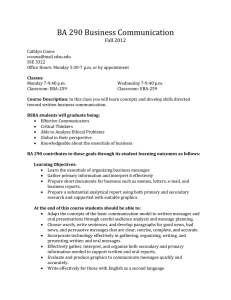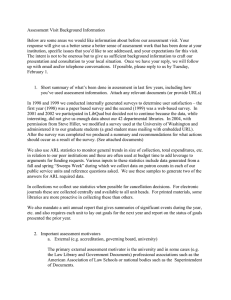SAN DIEGO STATE UNIVERSITY GRADUATE SCHOOL OF PUBLIC HEALTH
advertisement

SAN DIEGO STATE UNIVERSITY GRADUATE SCHOOL OF PUBLIC HEALTH Spring 2012 COURSE: PH 880 Program Planning and Evaluation This three-credit course is an introduction to program planning and evaluation in international health designed to give students practical skills in planning projects and programs and evaluating public health programs. It is required for Joint PhD students in the Global Health and is open to students in the Epidemiology and Health Behavior Joint PhD Programs, as well as to secondyear Master's students in public health or related health fields who are interested in careers in international health. The course will be practical and hands-on, with most readings drawn from guidance documents and manuals of international organizations, non-governmental organizations, and foundations directly involved in planning and evaluating international projects and programs. Students will be expected to do the basic readings and to complete a brief electronic quiz prior to class each week on these readings. Class time will then be used to review additional content material and to hear about real-world examples presented by practitioners. The planning topics will include stakeholder, SWOT, and root cause analyses; the development of objectives, logic models, and logic frameworks; selection of outcome indicators; and development of critical path analyses, timelines, and budgets. The evaluation portion of the course will address the basics of monitoring and evaluation, the types of evaluations and their uses, and methods for collecting and analyzing data, including survey design, cluster-randomized community trials, and difference-in-differences techniques. It will also cover how to communicate evaluation results to funders and program recipients. Much of public health practice involves working in groups with persons of varied backgrounds. For this reason, the course will involve extensive small group work, done in and outside of class and built around real-world examples, including planning the evaluation of camps for HIV/AIDS-affected children that will be conducted this summer in Ethiopia and Vietnam. Depending on the number of enrolled students, there may also an opportunity to design and conduct an evaluation of a US-Mexico border health project. Enrollment is limited to 12 students. There will be no midterm or final exam, with grading based on the quizzes, class participation, and the completion and presentation of the group planning project and evaluation proposals in written and oral form. For the group work, the same core grade will be given to each member of the group, although separate points will be granted for the individual oral presentations of the group’s efforts. It is likely that the group activities will take a minimum of two to three hours a week in addition to the reading and quizzes. Each group will have a mentor (Dr. Binkin, Dr. Novotny, or TA Sarah Hiller, MA). 1 COURSE OBJECTIVES Students who complete this course will be able to: 1. Describe results-based management and why it is the most common framework used in international health program planning. 2. Understand the use of SWOT, root cause analysis, and stakeholder analysis in the definition of problems prior to planning an intervention. 3. Develop problem statements, objectives and appropriate indicators to measure outcomes 4. Develop logic models for use in planning and evaluation 5. Describe the methods used to develop project time lines. 6. Describe the major components of a budget for planning purposes and how to estimate the major components 7. Define the major types of evaluation and list the main steps in performing an evaluation. 8. Describe the similarities and differences between monitoring and evaluation and when they are most appropriate 9. Describe the most common study designs for evaluations and the circumstances under which each is appropriate 10. Identify critical factors in designing questionnaires and scales for evaluation purposes 11. Describe the methods used for sampling in evaluation studies 12. Describe the methods used to assess statistical significance of trends over time and differences between intervention and comparison groups 13. Distinguish between cost-effectiveness and cost-benefit analyses and describe their role in evaluation studies 14. Describe key features of written and oral communication to stakeholders in evaluations. INSTRUCTORS: Thomas Novotny, MD MPH Professor, Division of Epidemiology and Biostatistics and Director, Global Health Joint Degree Program Phone: 619-594-3109 Office address 136b Hepner Hall Office Hours Tues and Thursdays 10-noon By appointment tnovotny@sdsu.edu Nancy Binkin, MD MPH Lecturer, Global Health Joint Degree Program Phone: (619) 906-2152 Office Hours: by arrangement; please send an e-mail or call to schedule Office address: HH 136A nancy.binkin3@gmail.com CREDIT: Three (3) semester units TIME: Wednesdays 1:00 to 3:40 PM, January 18, 2012-May 9, 2012 PLACE: Hepner Hall, Room 128 TA: Sarah Hiller, MA, JDP II student in Global Health sphiller@ucsd.edu 2 COURSE DETAILS There is no required text; readings will be drawn from pdf documents that will be posted on Blackboard and from chapters in texts that are available in the SDSU library. Weekly assignments, quizzes, other documents, news, and changes will be posted to the PH 700A Blackboard site. Registered students will have immediate access to this site. RESOURCES International Federation of the Red Cross and Red Crescent. Project/Planning Guidance Manual. Geneva, 2010. http://www.ifrc.org/Global/Publications/monitoring/PPP-Guidance-ManualEnglish.pdf University of Wisconsin Extension. Logic model on-line tutorial. http://www.uwex.edu/ces/pdande/evaluation/evallogicmodel.html WK Kellogg Foundation: Logic model development guide. http://www.wkkf.org/knowledgecenter/resources/2010/Logic-Model-Development-Guide.aspx Khandker, Shahidur R. Handbook on impact evaluation: quantitative methods and practices. The International Bank for Reconstruction and Development / The World Bank, 2010 http://www.esf-agentschap.be/uploadedFiles/Voor_ESF_promotoren/Zelfevaluatie_ESFproject/statistiek%20voor%20quasi%20experimenten.pdf Wholey JS, Hatry HP, Newcomer KE. Handbook of Practical Program Evaluation, 3rd edition, Jossey-Bass, San Francisco, CA, 2010. Ovretveit J. Action evaluation of Health Programmes and Changes: A handbook for a userfocused approach. Radcliffe Medical Press, Oxford, ENGLAND 2002 WK Kellogg Foundation: The WK Kellogg Foundation Evaluation Handbook. http://www.wkkf.org/knowledge-center/resources/2010/W-K-Kellogg-Foundation-EvaluationHandbook.aspx Western Michigan University Evaluation Center: Evaluation Checklists (includes several practical checklists on topics such as budget development) http://www.wmich.edu/evalctr/checklists/checklist_topics/ Fowler FJ. Survey Research Methods, 4th Edition. Sage Publications, Thousand Oaks, CA 2009. Bradburn N, Sudman S, Wansink B. Asking questions: the definitive guide to questionnaire design for market research, polical polls, and social and health questionnaires. Jossey Bass, San Francisco, CA 2004. 3 UNDP. Handbook on Planning, Monitoring and Evaluating for Development Results. See the following link: http://www.undp.org/eo/handbook/ Green L, Kreutzer M. Health Program Planning, 4th Ed. McGraw Hill, New York, NY, 2005. ASSIGNMENTS Class Readings Students are expected to read the assigned materials, which will consist of introductions and broad overviews of each topic and certain key papers. With some exceptions, they will not be covered during class time, which will be used instead for presentations on an interesting or controversial aspect of the topic, for class exercises, and for student presentations. The readings will be posted on Blackboard a minimum of 7 days prior to each class. Please consult Blackboard each week for the updated reading list. Weekly Quizzes Each week, a quiz on the week’s required readings will be posted on Blackboard each Friday by noon. Quizzes must be completed by 11:55 PM on the Tuesday prior to each class. Each will consist of 5 questions and a bonus question based on recommended but not required reading or involving greater synthesis of the readings. Immediate feedback on the score you obtain will be available on Blackboard. These quizzes will account for 20% of the grade. They are not meant to be group work, nor are they meant to be searches for key words in the relevant documents— you will only get out of this course what you put into it. Group Work Two group projects will be conducted: the first a real-world planning exercise and the second the development of an evaluation protocol for submission to the IRB. Each will be conducted in a series of progressive steps, with oral and written presentations at each step along the way. The final written product for the planning exercise will be a six-page proposal in the Bill and Melinda Gates Foundation letter of intent format (posted in the documents section of Blackboard). The evaluation project will be written in protocol format, with an introduction, objectives, an analytical plan, design of the evaluation, methods of data collection and data analysis, the instruments that will be used to collect the data, and ethical consent forms. There will also be an oral presentation of the evaluation background, objectives, and evaluation design. Grading Grading will be based on the following: Required attendance and participation Weekly quizzes Group grade on oral presentations Individual grade on oral presentations Group grade on planning and protocol documents 4 10% 20% 30% 5% 35% Letter grades will be based on cumulative scores: 100-95= A 79-75= C+ 94-90= A74-70= C 89-85= B+ 69-60= D 84-80= B <60 = F [non-passing grade] Attendance: Attendance will be taken during each class period by the TA. One excused absence is allowed, after which the attendance and participation grade will be reduced. Disclaimer: Course Syllabus Subject to Change Every effort will be made to follow the syllabus content and schedule; however, if circumstances dictate, there may be modifications necessary during the semester. The professor or TA will notify students in a timely manner. Academic Integrity: Academic dishonesty is an affront to the integrity of scholarship at SDSU and a threat to the quality of learning. Violations of academic integrity are noted in the SDSU Statement of Student Rights and Responsibilities: http://csrr.sdsu.edu/rights2.html/. Plagiarism: Plagiarism is academically and ethically unacceptable. Students are strongly urged to take the SDSU library’s online tutorial (http://infotutor.sdsu.edu/plagiarism/) and utilize the TURNITIN tool on Blackboard prior to submission of the written assignments. Statement on Nondiscrimination Policy San Diego State University complies with the requirements of Title VI and Title VII of the Civil Rights Act of 1964, as well as other applicable federal and state laws prohibiting discrimination. No person shall, on the basis of race, color, or national origin be excluded from participation in, be denied the benefits of, or be otherwise subjected to discrimination in any program of the California State University SDSU does not discriminate on the basis of disability in admission or access to, or treatment or employment in, its programs and activities. Students should direct inquiries concerning San Diego State University’s compliance with all relevant disability laws to the Director of Student Disability Services (SDS), Calpulli Center, Room 3101, San Diego State University, San Diego, CA 92128 or call 619-594-6473 (TDD: 619-594-2929). SDSU does not discriminate on the basis of sex, gender, or sexual orientation in the educational programs or activities it conducts. More detail on SDSU’s Nondiscrimination Policy can be found in the SDSU General Catalog, University Policies. Student Conduct and Grievances SDSU is committed to maintaining a safe and healthy living and learning environment for students, faculty and staff. Sections 41301, Standards for Student Conduct, and Sections 4130241304 of the University Policies regarding student conduct should be reviewed. 5 If a student believes that a professor’s treatment is grossly unfair or that a professor’s behavior is clearly unprofessional, the student may bring the complaint to the proper university authorities and official reviewing bodies. See University policies on Student Grievances. Statement on Plagiarism and Academic Dishonesty Academic dishonesty includes cheating, plagiarism or other forms of academic dishonesty that are intended to gain unfair academic advantage. See section 41301 of the University policies. Plagiarism is an important element of this policy. Plagiarism is defined as ‘formal work publicly misrepresented as original; it is any activity wherein one person knowingly, directly and for lucre, status, recognition, or any public gain resorts to the published or unpublished work of another in order to represent it as one’s own’. Any work, in whole or in part, taken from the Internet or other computer-based source without referencing the source is considered plagiarism. The course schedule is attached below but is subject to change. Date Presentations 18-Jan Brief introduction to course BINKIN/NOVOTNY The way things should work: an introduction to planning, results-based management, monitoring, and evaluation BINKIN Analyis in program planning: SWOT and root cause analyses and in-class exercise NOVOTNY 25-Jan Introduction to program planning exercise NOVOTNY/Bessenecker Analyis in program planning: Stakeholder analysis: why, who, what, and how HILLER Mentored group work: Preparing an analysis for assigned topic (SWOT, root cause, and stakeholder analysis) NOVOTNY/BINKIN/HILLER 1-Feb Designing a program: Problem statement, objectives, and logical frameworks BINKIN Mentored group work: develop problem statement, objectives, and logical framework (HILLER/BINKIN) 8-Feb Group presentations: Project analysis, problem statement, and objectives for assigned topic (Moderator: NOVOTNY) The art of selecting indicators BINKIN Mentored group work: selection of indicators (NOVOTNY/HILLER/BINKIN) 15-Feb Group presentations: logical framework and indicators MODERATOR: BINKIN Designing a program: Gannt charts and critical path management HILLER Designing a program. Budgets CLARK 22-Feb Monitoring and evaluation: a brief introduction BINKIN Introduction to class project Ethiopia and Vietnam evaluations NAGLER/HILLER (and border project BINKIN) Stakeholder interview with NAGLER (ESPINOZA/ PINEDO) Feb-29 Types of evaluation and steps in the evaluation process BINKIN Guided discussion: Options for Ethiopia and Vietnam evaluations HILLER An introduction to logic models and their use in evaluation BINKIN 7-Mar Presentation, results of stakeholder interviews An introduction to protocol development NOVOTNY Ethics in evaluations NOVOTNY 6 14-Mar Evaluation study design: an overview BINKIN Introduction to qualitative methods: focus groups, semi-structured interviews and stories HILLER Steps in gathering data BINKIN 21-Mar Introduction to quantitative methods: surveys, use of administrative data, and a word on sample size BINKIN Guided exercise: BINKIN/HILLER 28-Mar Spring break 4-Apr Group presentations of evaluation background, objectives, and evaluation design Moderator: HILLER A practical guide to questionnaire development BINKIN Scales and their validation: a presentation of proposed study instruments ESPINOZA/PINEDO 11-Apr Analytic techniques: measuring change over time when there is no control group TBA Analytic techniques: an introduction to mixed methods HILLER Example: Lesotho HIV evaluation TBA 18-Apr Randomized trials in evaluation TBA When you can't randomize: alternative study designs and methods BINKIN 25-Apr Analytic techniques: Difference in differences and other analytic methods for detecting changes in observational surveys with control groups TBA Presenting the data in an effective manner BINKIN 2-May Communicating the results to stakeholders and decision-makers HART Cost-effectiveness and cost-benefit TBA 9-May Wrapup of course BINKIN/NOVOTNY/HILLER Date Presentations 7


